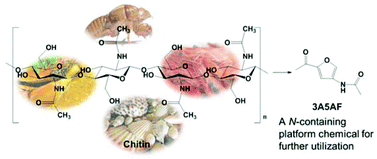Chitin is a main constituent of the exoskeletons of insects and crustaceans. Utilizing this biopolymer in the production of value-added chemicals, particularly nitrogen-containing aromatic compounds (e.g., furans), is a more sustainable route than their energy-intensive synthesis from ammonia. Chitin may be subjected to hydrolysis reactions to produce N-acetyl-D-glucosamine (NAG), its monomeric constituent. Kerton et al. previously reported a high-yielding synthesis of 3-acetamido-5-acetylfuran (3A5AF) by the direct dehydration of NAG. In this paper, Kerton and researchers from the National University of Singapore aimed to combine the two steps to generate NAG in situ from chitin and convert it to 3A5AF.
In order to dissolve chitin, its extensive hydrogen-bonding network must be tempered. The use of polar, aprotic solvents in combination with metal salts can accomplish this challenging task, enabling the dehydration reaction to occur more easily. Chloride-containing salts or additives also facilitate the reaction, which is suspected to occur through their disruptive effect on the hydrogen bonds. Dual or tri-component additive systems of boric acid with alkali or alkaline earth metal chlorides resulted in the highest yields of 3A5AF. The optimized conditions used boric acid and sodium chloride in NMP (N-methyl-2-pyrrolidone) to give ca. 7.5% 3A5AF, while 50% chitin conversion was achieved, representing an array of other products. Pre-treatment of chitin to initiate the depolymerisation was suggested as a potential means to increase 3A5AF yields.
Read this article now, we’ve made it free to access until 3rd March:
Direct conversion of chitin into a N-containing furan derivative
Xi Chen, Shu Ling Chew, Francesca M. Kerton, and Ning Yan
Green Chem., 2014, Advance Article, DOI: 10.1039/C3GC42436G
 Jenna Flogeras obtained her B.Sc. and M.Sc. in Chemistry from the University of New Brunswick (Fredericton), Canada. She is currently working towards her Ph.D. at Memorial University of Newfoundland, under the supervision of Dr. Francesca Kerton. Her research is focused on the synthesis of biodegradable polymers using main-group metal complexes as catalysts.
Jenna Flogeras obtained her B.Sc. and M.Sc. in Chemistry from the University of New Brunswick (Fredericton), Canada. She is currently working towards her Ph.D. at Memorial University of Newfoundland, under the supervision of Dr. Francesca Kerton. Her research is focused on the synthesis of biodegradable polymers using main-group metal complexes as catalysts.










